PopEntertainment.com >
Feature
Interviews - Actors > Feature
Interviews - Actresses >
Feature
Interviews - Directors >
Features Interviews F to J
>
Feature Interviews K to O
>
Feature Interviews P to T >
Christopher Guest, Eugene Levy, Catherine
O'Hara, Harry Shearer and Parker Posey

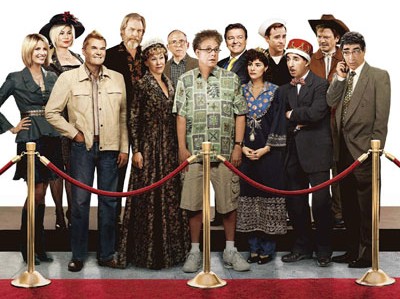 Christopher Guest, Eugene Levy, Catherine O'Hara, Harry Shearer and Parker
Posey
Christopher Guest, Eugene Levy, Catherine O'Hara, Harry Shearer and Parker
Posey
Consider This
by Jay S. Jacobs
Copyright ©2006 PopEntertainment.com. All rights reserved.
Posted:
November 17, 2006.
Working on the outskirts of the
Hollywood movie community, actor-writer-director Christopher Guest
has put together the most consistently funny troupe in films.
Specializing in improvisational movies – many which are
hilarious turns on
documentaries – Guest has made some of the great comedies of the last
twenty-five years.
It
all started when he and his partners Harry Shearer and Michael McKean
created the ultimate rock and roll parody, This is Spinal Tap, with
director Rob Reiner. The movie was a cult favorite – so much so that it
spawned two albums, singles, a couple of tours and two post movie videos.
In fact, as this article is being written, Guest is appearing in a
Volkswagen commercial as Tap guitarist Nigel Tufnel.
Guest, McKean and Shearer have worked together in many films since –
including The Big Picture (1989 – without Shearer), Waiting for
Guffman (1996), Best In Show (1999) and A Mighty Wind
(2003). All of them celebrate forms of show business and the people who
have the drive and the love to try to take them on – even if they don’t
always have the talent.
By
Guffman, Guest had hooked up with former Second City TV
stars Catherine O’Hara and Eugene Levy. Other talented minds joined
up like indie actress Parker Posey, character actors
such as
Bob Balaban,
as well as longtime comic actors
Fred Willard, Jane Lynch, John Michael Higgins and Jennifer Coolidge.
Guest still periodically does straight acting gigs – he was in classic
films like The Princess Bride, A Few Good Men and Mrs. Henderson
Presents. He also took one ill-considered shot at traditional
Hollywood direction with Almost Heroes, a silly comic western with
Matthew Perry and Chris Farley (the film is best
remembered now
–
if it is remembered at all –
as Farley’s last film.)
However, he is really in his zone with his improvised show business
films. The latest is For Your Consideration, a look at the making
of a little movie which becomes besieged by Oscar fever.
A
couple of weeks before the opening of For Your Consideration,
Guest, Levy, O’Hara, Shearer and Posey all sat down with us at the
Waldorf-Astoria in New York to discuss the new film and what makes their
movies work.
In
For Your
Consideration, I love the fact that you have these characters who even
at the hint of an Oscar go totally overboard. Is that how it
really is?
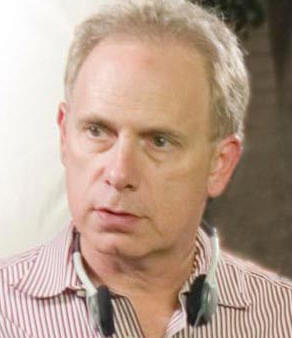 Christopher Guest:
Absolutely, yeah. I think we’ve both been through it in our careers and
seeing this happen. It’s kind of like an airborne virus, really. No
person that hears that can process that in a healthy way. You hear it and
there it is. It’s inside you and you’re gone. You’re done. You’re
cooked. That’s it.
Christopher Guest:
Absolutely, yeah. I think we’ve both been through it in our careers and
seeing this happen. It’s kind of like an airborne virus, really. No
person that hears that can process that in a healthy way. You hear it and
there it is. It’s inside you and you’re gone. You’re done. You’re
cooked. That’s it.
Eugene Levy:
I think as opposed to Catherine’s character, if you have some degree of
intelligence about you, you would be flattered and you still are trying to
kind of get this thing out of your head.
Christopher Guest:
They can’t really…
Eugene Levy:
No, no, well the
point is that you can’t. You can’t do it. But you don’t necessarily jump
to, “I’ve got a shot at the Oscar.” You don’t necessarily go there.
Christopher Guest:
Some people would.
Eugene Levy:
Well, certainly Marilyn Hack did. But you find yourself talking to
yourself. Even if you say, “You know what? Ridiculous. Don’t even think
about it.” Now you’re talking to yourself. About it. And you can’t get
it out of your head.
Have you ever been in
the middle of the award mania like in this film?
Catherine O’Hara:
No. Never,
never even close. (laughs) Yeah, I have an Emmy. For writing,
for a show I used to do with Eugene Levy and a bunch of people – SCTV.
We were all very excited. We did the show in Toronto and Edmonton and it
was all about the work (chuckles) all day long. We were all in the
hotel – I mean the producer just took us away from everything familiar to
us and our homes and families so it would be all about the work.
Christopher Guest:
When I was fairly young – twenty-three, twenty-four – I was nominated for
a Grammy award three times in a series of a few years. Lost all those.
Twenty years later, we both won for A Mighty Wind, weirdly enough.
I’ve had both sides of this. Emmy Awards… we’ve both had Emmy Awards.
We’ve both been up for awards and lost and won, but it’s also meeting
other people that have been through this. It’s a really tragically
bizarre situation. I’ve known actors that are quite well-known where
they’ve just heard from someone – not anyone – just someone, “You should
win.” Rumors, rumors, rumors… Then it actually finds its way into
print. Then there’s nothing. There’s no nomination. And then they are absolutely bottomed out, based on nothing other than the
guy in the hardware store saying, “I think you…” Seriously, it doesn’t
have to be more than that. Then it gains some credence. In the same way
that we’ve got this internet thing. We talked a long time about, what
would be the beginning of this germ? The internet is perfect, because
it’s just, “What? Who the hell? What is this?” You can’t really pin it
down.
Eugene Levy:
Well that’s where
it happens.
Christopher Guest:
And it gets out and millions of people see it. Some person that actually
writes an actual newspaper might say, “Well, we hear that…,” and you’re
done. Then, it’s almost reality. But it isn’t. It’s just madness. It’s
just complete madness.
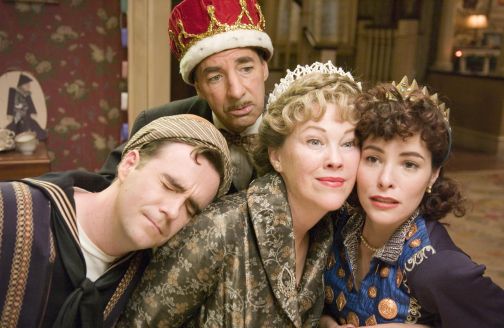 You
guys have done these great films where you’re really making fun and kind
of like fighting the system. Now you’re doing one about
Hollywood,
about your craft. Did you dig in with a little more glee this time?
You
guys have done these great films where you’re really making fun and kind
of like fighting the system. Now you’re doing one about
Hollywood,
about your craft. Did you dig in with a little more glee this time?
Catherine O’Hara:
Don’t get caught saying “mockumentary” with Chris. Documentary.
(laughs) It’s true. We never make fun of anyone. I think when
you’re in it and you improvise and you’re trying to be in character,
you’re not outside making fun. I’m sure when they’re writing it, there’s
got to be some laughs about the kind of people they’re writing about.
Then when we first read it, I guess we’re laughing, imagining the whole
thing. But when we’re actually improvising, you’re just trying to be in
character. (laughs) But, it’s actually a little more torturous
doing this, because it’s a little too close to home. For me, anyway.
Parker Posey:
It’s not a mean send up at all. I think it’s very compassionate.
It’s almost too nice…
Harry Shearer:
In some ways, it is. It’s, I think, by locating a particular tier of work
that Chris and Gene did, they allowed us to escape the depicting some
truly awful and abusive behavior that goes on at a slightly higher salary
level in Hollywood.
Parker Posey:
Yeah, yeah, yeah. They’re so kind of in their protective world; they
don’t even have to live in the real nasty…
Harry Shearer:
You know, Morley Orfkin, as bad an agent as he is, is just a bad agent.
He’s not a loathsome or larcenous one like a few agents.
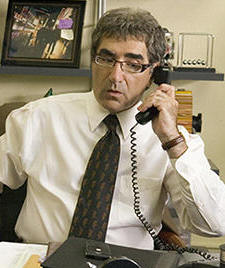 Eugene, how did your agent feel about your role?
Eugene, how did your agent feel about your role?
Christopher Guest:
(to Levy)
You have an
agent?
Eugene Levy:
Yeah. Not any more. (laughs) Thank you for encouraging me to do
the part. No, they took it with a good sense of humor. So they say.
Christopher Guest:
You haven’t
heard from them since.
Eugene Levy:
I don’t think they truly thought that this was about them specifically,
like in an impersonation, which it wasn’t. But I have to say there’s a
lot of things that come out in the lines that I’ve heard over the years.
The classic is, “Hold all my calls. I’m in a meeting with Victor Allan
Miller. I don’t
want to be disturbed.” You know when you walk in; you hear that, they
couldn’t care less honestly. They’re waiting to go to lunch. You know.
You already know. They don’t really mean it. It’s not that critical. If
it’s Tom Cruise walking into an agent’s office, I guess it’s “Hold all my
calls” and they mean it. But I don’t think that they were too…
Christopher Guest:
Well, in the case of the agent he plays, he’s not getting any calls.
Eugene Levy:
That’s the other thing, of course. There are no calls. The only thing I
can say is we really tried… I couldn’t have lowered the mental bar any
lower on this character, to the point where you think no one could
possibly recognize themselves. Being that dumb. But maybe I’m wrong.
Speaking of lowering
the mental bar, some of my favorite scenes were with Fred and Jane Lynch
in the take offs of the “info-tainment” shows. How hard was it to get
into that kind of shallow, vapid mindset?
Eugene Levy:
That was beautiful.
Christopher Guest:
That’s the
most fun stuff.
Eugene Levy:
We wrote – that
dialogue is actually written and was on prompters, because I wanted to
have that… it’s a very subtle difference when someone’s reading from a
prompter, it’s different from if they’d memorized it. They were
unbelievable. Unbelievable.
Christopher Guest:
I had never
seen those shows. I actually got someone to make me some tapes of those
kinds of shows. It was pretty shocking. Truly, I’d never seen them.
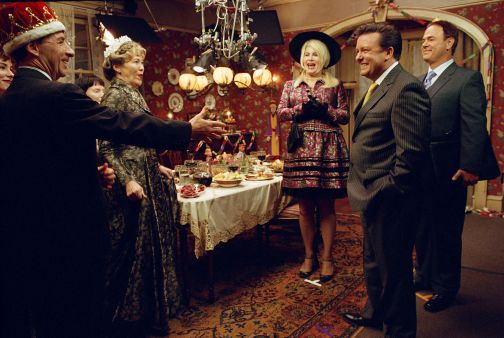 Most
of your films are done in a documentary style, but this one…
Most
of your films are done in a documentary style, but this one…
Christopher Guest:
Thank you for saying that. No, no, seriously, because most people use the
term… another term which I don’t want to bring up… That’s the first time
I’ve heard that.
Well, Catherine warned
us…
Christopher Guest:
Oh, then it doesn’t count. I take it back.
This actually kind of
reminded me a bit of one of your earlier films,
The Big Picture. How is doing a more straight-forward
film different?
Christopher Guest:
Well, this is a narrative. It’s not done in documentary style, so that is
different. But it is improvised. The Big Picture we wrote the
script – I wrote the script with Michael McKean. So this is different
because it goes from scene to scene.
I’d think you must have
a real fan base amongst other actors who are jealous you get to work this
way… Do you get constantly besieged by people wanting to get in?
Christopher Guest:
I think that besieged is strong, but people do come up to me that are
known actors, good actors, and write me letters. Yeah, I do.
Do you respond?
Christopher Guest:
I do. I do respond. Generally the thing is, if they’re very famous –
certainly for when we’re doing the documentary films – it didn’t work at
all. It didn’t make any sense. In this area, it still sticks out a bit
if you were to say to Tom Cruise, now you’re playing the part of a thing…
It’s a little odd.
Did Tom Cruise call
you?
Christopher Guest:
No, he actually didn’t. Let’s say he hadn’t. But it does come up, known
people in movies. But if they don’t really fit in – this is a very
specific kind of work. It’s not everyone that you can say, oh, yeah, just
jump on. Sure.
I’d love to know the
process where you let them down easy.
Christopher Guest:
You basically say thank you, that’s very nice. I don’t know what else to
say. We’ve added to this company. This is now larger than it was,
obviously, when we first made these movies. Richard Kind and Sandra Oh
are in a scene. Sandra’s a well-known actor… and so is Richard actually.
They’ve both done a lot and really were perfect for those parts. But you
can only expand so much.
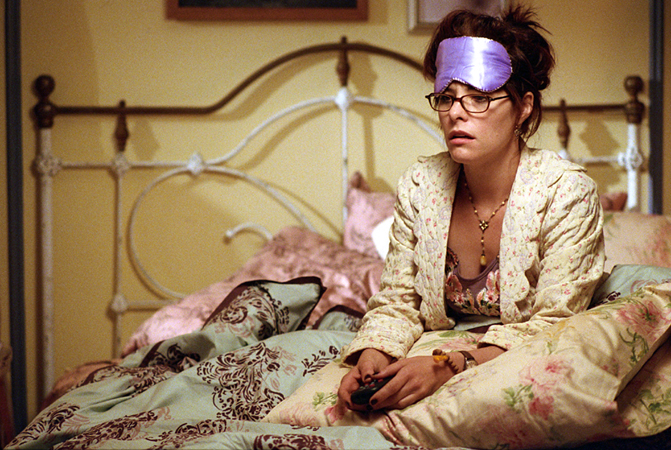 Are
you ever around acting friends who say to you, hey can you put in a good
word for me or maybe introduce me to Chris and Eugene?
Are
you ever around acting friends who say to you, hey can you put in a good
word for me or maybe introduce me to Chris and Eugene?
Parker Posey:
Yes. Sam
Rockwell. (laughs) A couple of days ago. “Is there any way I
could…? What would I have to do to, uhh…?”
Oh,
he's great. What did you tell him?
Parker Posey:
I just shrugged. I said, do you want to go to the screening? He was, “I
don’t know if I want to schmooze… Go up to him and introduce myself to
them. They must get that all the time.” It’s kind of, I don’t know. I
probably wouldn’t introduce them. I don’t know, I don’t know how I’d
handle it.
How do you know if an actor would fit
in?
Harry Shearer:
I think there are actors who like to work that way and actors who don’t.
Who would be terrified by it. Most of my friends who are actors are
already in these pictures, so I don’t have that problem. I have a lot of
non-show business friends, so… They don’t want to be in these movies.
Parker Posey:
Part, too, is if you’re ever on a set and they say, “We’re going to
improvise this,” and everyone just starts sweating and going crazy.
Everyone needs to get their line in. It takes a particular type of energy
in a director to make it work. Chris is incredibly kind and trusting.
You don’t get that. You don’t get that feeling. You don’t get the
support of knowing that you’re working with these great actors. Because
it’s a lot of trust. An incredible amount of trust. Like balancing a
bunch of books on your head and walking. You have to focus, but you have
to relax at the same time.
Catherine O’Hara:
He directs with such a light hand. A light touch. He just kind of guides
you…
Harry Shearer:
There’s a real distinctive energy level on these movies, that’s so
non-frantic, non-pressurized. Non… (mocks someone babbling) It’s
the polar opposite of that. One could walk in and…
Parker Posey:
Not know the cameras are on.
Harry Shearer:
Not know the cameras are on, not think anything is going on. There is so
little of that high pressurized thing. It’s the opposite of that. That’s
what allows everybody to relax. To hide the fear into the doing the
stuff.
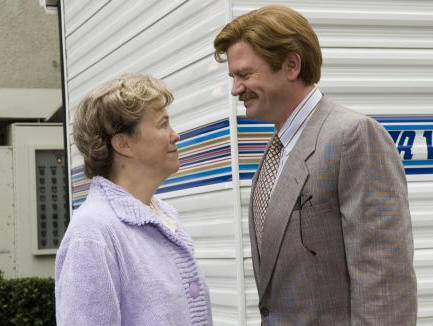 Does
Chris ever get mad?
Does
Chris ever get mad?
Catherine O’Hara:
Chris get mad? Uh, yeah, well… Not to us. No, he’s really kind. He’s
like Corky from Waiting for Guffman on the set. He’s so
loving. He just makes you feel you can do no wrong. He can be very funny
and dry about things in the world. He’s an unusual guy. I can’t even
claim to know him that well, really. I’m glad to get to work with him and
be in his circle. He is so loving and affectionate, once he lets you in
that he’s very careful with people he doesn’t know. I’ve heard him be fed
up with things in the world. Frustrated with things in the world. But he
doesn’t gossip, so you feel stupid if you do. And I know he really takes
care of his characters. He’s very respectful of [them], even though I
know it looks like we’re really making fun of people and going for the
jugular sometimes, honestly, I know we’re kidding ourselves, but it
doesn’t feel that way when we’re doing it. In this movie… on the set, you
talk about this, you talk about that. He never let any characters talk
about another character when they weren’t in the room.
How do you keep from
just cracking up? How do you keep from laughing when you’re directing or
acting?
Eugene Levy:
Don’t even ask.
Christopher Guest:
Every once
in a while people laugh at a scene. It doesn’t happen all that much.
Catherine O’Hara:
You don’t.
You can’t. You’re improvising, everybody is improvising and trying to be
in character. If you look through your character and you see this
ridiculous bit that someone else is doing, you can find a way to… Like
Eugene Levy in Waiting for Guffman. We were all on the same set
all the time. It would be they go to rehearsal. It was the first movie
that we did together this way, too. Fred Willard was insanely funny.
Eugene would be laughing all the time and he would go and look at
curtains. Anything, find a way to look at a book shelf. Go around a
corner. The moment will never happen the same way again. Even with a
script, it’s not the same from take to take – especially when different
words are coming out, it really never will happen the same. You don’t
want to sabotage it. And that kind of is, you blow it. You sabotage
yourself or the other people. The take is gone forever if you just start
laughing.
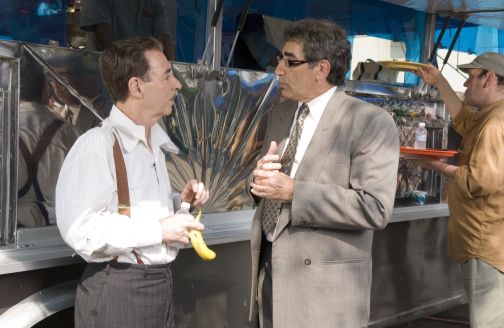 Eugene
Levy: It
happened more in the first one, I think, Guffman. The whole
experience was so novel. There was just something about Chris’ character,
Corky, that got on everybody’s funny bone. For me it was those dance
moves that he did. He actually did them this morning in one of the rooms
and it brought it back. There were times where I had to, in the middle of
a scene, drop down, honestly, to my knees at the back of the crowd. In
the scene where he’s teaching us this dance in Guffman. I had to
crawl off the set in order not to ruin the take. It’s true. I figured if
I worked my way to the back of the crowd and then drop off and fall, they
could still do the scene. Nobody would know. That happened a few times
on Guffman. There was some very spontaneous laughter. But the
thing about the laughing is – and maybe it was because it was the first
film and we didn’t really realize what actually we were costing the movie
by doing that – although they’re good memories, is that you can sabotage
the movie by ruining what could potentially be a great take. Because
these movies are improvised, things are happening that are extremely
funny, but it’s a moment that…
Eugene
Levy: It
happened more in the first one, I think, Guffman. The whole
experience was so novel. There was just something about Chris’ character,
Corky, that got on everybody’s funny bone. For me it was those dance
moves that he did. He actually did them this morning in one of the rooms
and it brought it back. There were times where I had to, in the middle of
a scene, drop down, honestly, to my knees at the back of the crowd. In
the scene where he’s teaching us this dance in Guffman. I had to
crawl off the set in order not to ruin the take. It’s true. I figured if
I worked my way to the back of the crowd and then drop off and fall, they
could still do the scene. Nobody would know. That happened a few times
on Guffman. There was some very spontaneous laughter. But the
thing about the laughing is – and maybe it was because it was the first
film and we didn’t really realize what actually we were costing the movie
by doing that – although they’re good memories, is that you can sabotage
the movie by ruining what could potentially be a great take. Because
these movies are improvised, things are happening that are extremely
funny, but it’s a moment that…
Christopher Guest:
It will
never happen again.
Eugene Levy:
… we can’t duplicate again. If you say, oh, no, we’ve ruined that. Oh,
no, no, no. Well, let’s do exactly what you did before when you said the
line. It’s not the same. So you have to have the strength to not laugh
and sabotage the take.
Catherine O’Hara:
You can
laugh in character. If your character finds it funny, that’s a way to do
it. I’ll never forget when we did this dinner scene and I was playing
drunk and Eugene and I were trying not to laugh for the whole scene. I
was drunk so I was so undisciplined anyway. I could just (makes
drunken gesture) whatever… One part – and it’s in the movie – I go
down like I dropped something, to pick [it] up. I was just going under
the table to laugh. It does happen. But for the most part, we’re all,
“I’m in character. You’re in character.” We’re there. And my character
in this movie is so not inherently funny that I took every moment
seriously. If people were being funny, my Marilyn didn’t even get it.
What makes you decide
on the subjects?
Christopher Guest:
Sometimes,
things come to me. Then I’ll call Gene and say, “How about this?” If I’m
lucky enough to have an idea, I’ll call him up and say, “Maybe we can do
this.” That’s how.
Do you ever have ideas,
Eugene?
Eugene Levy:
Yeah, they’re all
turned down.
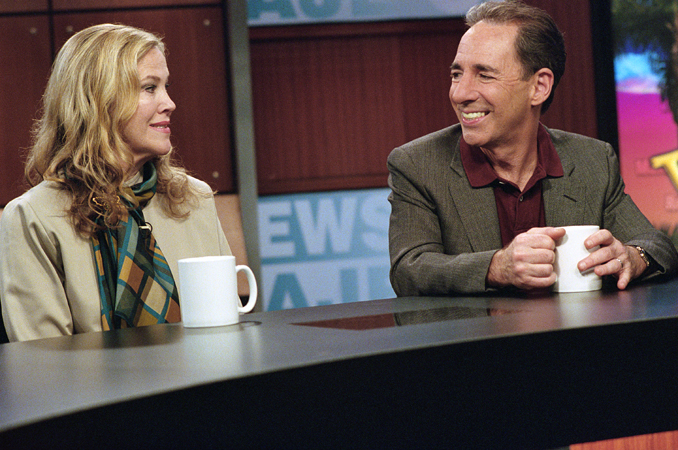 How
much do you know when you go into these projects?
How
much do you know when you go into these projects?
Catherine O’Hara:
You have the script. You have the whole script. A script with no
dialogue; except – in this movie – the Home for Purim scenes. If
you can believe it, that dialogue was written. (laughs) I don’t
believe anybody could make it up.
The
Home for Purim stuff
was all written and so melodramatic. Was it hard to stay straight?
Parker Posey:
Yeah, I had a very serious book I was reading. It was about 800 pages
long. It’s called Shantaram by Gregory David Roberts. It’s a true
story. He escapes from maximum security prison in Australia to go live in
Bombay. He gets involved in the drug market. He eventually goes to war
in Afghanistan during the 80s. He was getting tortured. I was reading
that during the scenes so I wouldn’t start… I mean, there was a lot of
sweating. Especially with Catherine, who had a big chunk of dialogue
during [the Home for Purim scene]. It took two days to cover that
scene and she would get more and more carried away with how she would say,
(imitates) “Put the toys down.” And she’s just doing all this
stuff and you don’t want to laugh at her and you want to be there as the
actor in the movie for off-camera stuff. And then we sang the song…
Harry Shearer:
About a million times.
Parker Posey:
… about a
million times.
Harry Shearer:
Do you remember it now?
Parker Posey:
Yeah, it still
comes into my head sometimes. (They hum-sing it together)
You have worked with
Chris for years. He does really funny films. It seems everything is
always so on. He says you only do three takes. Is there ever a time when
you’re involved in a scene and you… we talked about people laughing in
scenes and whatever, because they didn’t want to ruin the take. But was
there ever a time when you’re like, I’ve got nothing…
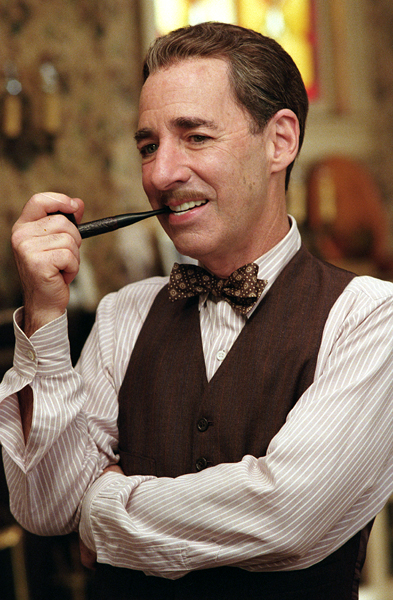 Harry
Shearer: The
thing about these is that you don’t have to talk. There’s no expectation
that you’re going to talk, you’re going to score, you’re going to come up
with a great line. You just have to be your character in the scene and
you need something. Victor needs something in the scene. You just have
to figure out a way to get it. Otherwise, there are plenty of talented
people there to carry a scene. It’s not on anybody to save the thing.
It’s not even if you don’t have anything. It’s not like you come to the
set with… you can… we were talking about this in an earlier session, you
do work beforehand and I take walks every night and think about it the
next day. Then you take those intentions and leave them at the door,
because what happens in the scene is not up to you. It’s up to this group
consciousness that evolves when all of these characters come into
interplay. So, even if you don’t think you have anything when it starts,
you may surprise yourself. And vice versa.
Harry
Shearer: The
thing about these is that you don’t have to talk. There’s no expectation
that you’re going to talk, you’re going to score, you’re going to come up
with a great line. You just have to be your character in the scene and
you need something. Victor needs something in the scene. You just have
to figure out a way to get it. Otherwise, there are plenty of talented
people there to carry a scene. It’s not on anybody to save the thing.
It’s not even if you don’t have anything. It’s not like you come to the
set with… you can… we were talking about this in an earlier session, you
do work beforehand and I take walks every night and think about it the
next day. Then you take those intentions and leave them at the door,
because what happens in the scene is not up to you. It’s up to this group
consciousness that evolves when all of these characters come into
interplay. So, even if you don’t think you have anything when it starts,
you may surprise yourself. And vice versa.
Do you ever get tired
of each other after working together on so many movies? Are you afraid
you won’t come up with anything that’s funny?
Catherine O’Hara:
We always get scared. Not about not liking each other and not getting
along. The first time you open your mouth in character is really scary,
because you’ve got to know the background. You get the background and
then the voice comes out. And you’re like, what if you’ve made a bad
choice and you’ve got to stick with that for 25 days? You commit.
(makes choking noise)
Did you have people in
mind that you were parodying, or was it just your own experience?
Catherine O’Hara:
There is an
actress who has kind of a look – who felt that work was a better
character. She let herself age easily in roles and didn’t seem to have an
ego about it. And she probably didn’t. This is not her, but I kind of
jumped on her look and the way she took the work very seriously. It was
all about serving the script and honoring her character. Actually, my
voice, that I tried to do, was CBC Radio in Canada. All the women talk
funny. (laughs) It was just like laugh of the voice. Actually
the majority of working actors are working actors. They’re not the
people you read about. They’re not invited to the head table. They maybe
have long ago given up the idea of being invited to that table. It’s
about the work. This woman did not chit chat on the set. She would
disappear into her trailer and come back to work. She was just mysterious
to me, because I’m standing around laughing all day, not thinking about
the job. (laughs) And not doing it well. So, I’m kind of
fascinated with her and what her life might be like and then this came
along and I just needed to sort of get a starting point and I picked her.
But it’s really not her. It was kind of a look or something…
Christopher Guest:
It’s a conglomerate of twenty different people that I’ve met.
Harry Shearer:
It was much more like this guy is just like me, seriously, if I couldn’t
go do other stuff. If I couldn’t go off and do Simpsons and write
a book or do other things and I was just waiting for the phone to ring for
my next acting gig. I would be in Victor’s shoes. So that was really the
work I did, I just stripped away all that other coping mechanisms and
Victor is what’s left – this puddle of vulnerability and yearning.
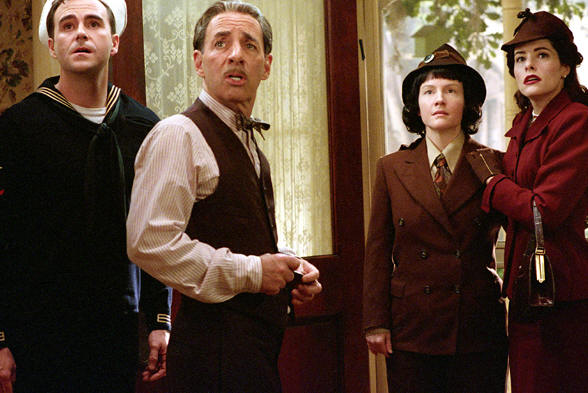 Parker
Posey: I
think with Callie, she has a lot of feeling and a big need to express. I
think she should be in therapy instead of on stage. This is what happens
when you can’t go to therapy. Do you become an actor? Do you do a
one-woman show? Do you think you’re an actor? I don’t live in LA, so I
get to kind of look at it and observe it when I go out there. I know
there’s a lot of road rage, as well as a sense of entitlement. There’s a
lot of stardom in the culture.
Parker
Posey: I
think with Callie, she has a lot of feeling and a big need to express. I
think she should be in therapy instead of on stage. This is what happens
when you can’t go to therapy. Do you become an actor? Do you do a
one-woman show? Do you think you’re an actor? I don’t live in LA, so I
get to kind of look at it and observe it when I go out there. I know
there’s a lot of road rage, as well as a sense of entitlement. There’s a
lot of stardom in the culture.
Parker just mentioned
that she’s not living in LA, and Chris also said that earlier. Do you
think these things feel so free because it is not a whole bunch of people
who are immersed in show business?
Harry Shearer:
It’s definitely easier for me to be able to go to
New Orleans
and be in another time and place. My wife, who is in the music business…
Judith Owen.
Harry Shearer:
Yeah… it’s real important too for her to go to a place where people play
music for a whole different set of reasons – cultural as opposed to
commercial. Yet, LA’s my hometown. There’s a lot I really like about
it. Especially if you don’t hang out mainly with show business people.
There’s a whole other LA that tends to get overshadowed. But, definitely,
not being immersed in the
Hollywood part of LA is, I think, pretty useful. Although, you know, there are
people in these movies who work steadily in mainline
Hollywood and they seem
to be okay. I guess it’s more a matter of personal temperament than
anything else. I remember my first real adult exposure to commercial
Hollywood, and I kind of ran fleeing from it. (laughs)
What happened?
Harry Shearer:
Partners of mine, we were in a comedy group and partners of mine took
characters from that group and basically walked into a little show called
Laverne and Shirley. I was brought along to work with them on
those characters. Garry
Marshall
kept saying, (imitates him) “You be a guy in the drive-in with the
things.” I’m saying to myself in my head, over my dead body.
Boy, you captured Garry
Marshall…
Harry Shearer:
Thank you… He’s nice, Garry.
The movies you make,
people really connect with them. They become part of their lives…
Christopher Guest:
Well, I don’t know. I guess if that’s true, that’s good. As opposed to
the other scenario – of that not happening. I don’t know. I don’t really
think about that. I think we’re fortunate because we can make these
movies and we can control these movies and then they go out there and
nobody messes with them. There’s no director’s cut. That is the
director’s cut. So, I guess I’m very fortunate to be in that situation.
But I don’t really look at it in a broader way.
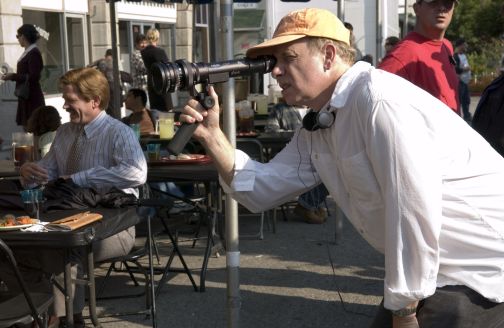 People
really do refer to things like, “That’s a
Waiting for Guffman-type
of moment.”
People
really do refer to things like, “That’s a
Waiting for Guffman-type
of moment.”
Christopher Guest:
See, I don’t get out enough, then, because I don’t hear that. There are
people who stop you on the street and say things every once in a while.
Like, “Move out of the way,” they’ll say. Occasionally a guy… what guy?
Some guy in my world – it’s a little disorienting because we’ve been
traveling a lot – some guy said to me something about “this knob going to
eleven,” which was a reference to Spinal Tap, which I hear three
times a day. Now, it’s so frequent you just say, oh… I don’t know what
to say. I don’t know what I’m supposed to say. “This goes to eleven.” I
guess you’re part of this, too. Good.
Is it amazing after all
you’ve done that you can keep juicing each other with improvisational
work?
Christopher Guest:
Well, you have to realize it’s every three years, so it’s every two and a
half years. I can’t make these movies very often. So, Gene or Parker or
Catherine, they go off and they actually are in show business. People
call them up and say, will you be in a movie? I’m working on these for
two years and then I take about a year off to just do normal things – not
show business things. It’s always weird, though, to be in editing –
eleven months in editing – and talk to Parker on the phone, how’s it
going? She says, “Good. I’ve done four movies since we’ve wrapped.”
Four movies. And I’m still sitting in an editing suite, looking at the
same stuff. I’m still living in that world. They’ve gone off and they
have kids go through college and…
Eugene Levy:
But we still think about you.
Christopher Guest:
But literally I’m looking at their faces every day. It’s weird.
Chris was telling us
you’re doing four movies while he is making his one film… How do you
manage to balance all of these movies and keep sane?
Parker Posey:
Yeah. That’s the
word. Separate yourself and try to relax. I have all of these movies
that I’ve been attached to since, you know… two, three, four years. They
were all getting financed at the same time. So you can make a movie for a
million dollars. So I went back to where I started in my career – making
[indie] million dollar movies. I did Fay
Grim. I did Spring Breakdown.
And you did
Superman…
Harry Shearer:
The indie Superman.
Parker Posey:
And the indie
Superman. So they all just kind of like – you know, you just have to
go with it. They all kind of came at the same time.
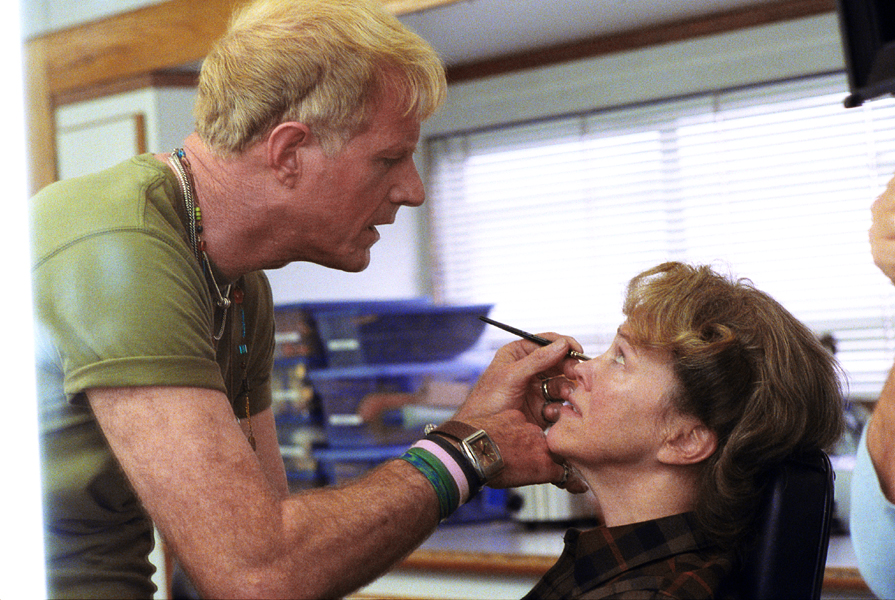 Is
it a huge adjustment going from Chris’ improv style to other more
traditional roles?
Is
it a huge adjustment going from Chris’ improv style to other more
traditional roles?
Catherine O’Hara:
Uh. I just don’t work that often. I really don’t. If I get offered
something and I read the script, it has to have something in it, because
ultimately it’s your face on camera. Like, “why did you do that?” Well,
if you’d read it… It was good, I swear it was good. Seeing that, you
know, people that you want to work with. I have to grab onto something
that makes me want to take my time and effort. If you work with good,
confident people, you can still feel like you have something to offer. If
you start with a great script, I did some Six Feet Unders, and it’s
so well written. I was not inclined to change a word. You know, it was
like, oh, yeah, thank you. Yeah, I’ll do this.
It’s great to have this
as a creative outlet; and to also have
The Simpsons, after twelve, thirteen years…
Harry Shearer:
Eighteen.
Eighteen years…
Harry Shearer:
I’ll take it. Any bids for nineteen?
To have the show still
be here and relevant satire, do you feel blessed to have two such outlets
in your career?
Harry Shearer:
Yeah. I think anybody who’s on a hit anything is blessed. Anybody who’s
working in show business – five percent of the members of the Screen
Actors Guild are working. Five percent. That’s like the number of
Americans with a passport. So, A) You’re working. B) You’re on a hit.
C) You’re on a good hit. D) You’re on a hit that’s lasted eighteen
years. Good lord, you know? How lucky can you get?
What more can you ask
for?
Harry Shearer:
Well, you can ask for more money.